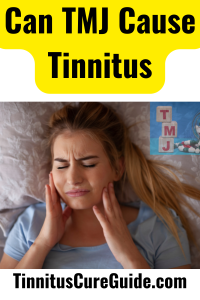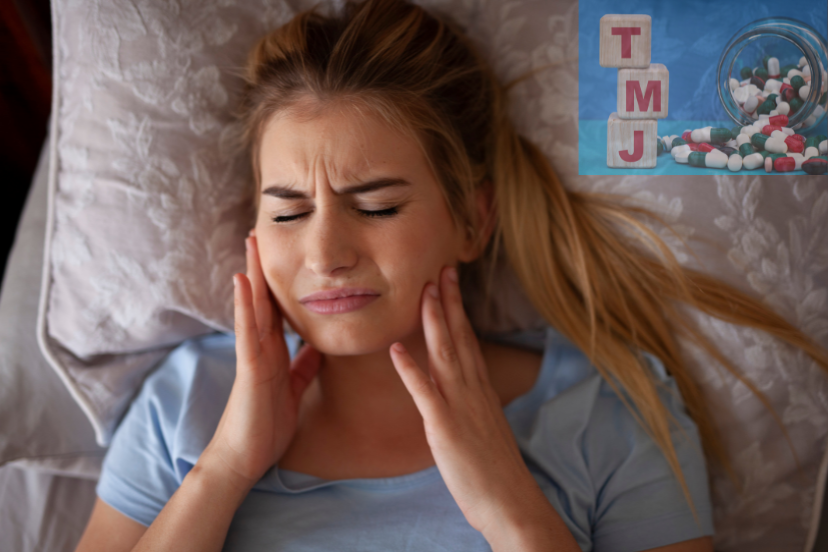Can TMJ Cause Tinnitus? How Jaw Problems Can Trigger Ringing In The Ears
🔍 Can TMJ Cause Tinnitus? (Quick Answer)
Yes — TMJ disorders can cause tinnitus or make existing tinnitus worse.
TMJ issues can irritate nearby muscles, joints, and nerves that share connections with the ear and auditory pathways. This can lead to ringing, buzzing, clicking, or pressure sensations that change with jaw movement.
TMJ-related tinnitus is often treatable and highly manageable, especially when the jaw problem is addressed early.
🧠 Why TMJ Can Affect The Ears
The temporomandibular joint (TMJ) sits very close to the ear canal and middle ear structures. More importantly, the jaw joint and surrounding muscles share nerve pathways with areas involved in hearing and sound processing.
When the jaw joint is inflamed or misaligned, it can trigger:
-
Muscle Tension Around The Ear
-
Irritation Of Shared Nerve Pathways
-
Changes In Jaw And Neck Posture
-
Increased Sensory Sensitivity
This is why TMJ problems can create ear symptoms, including tinnitus, ear fullness, and even sound sensitivity.
🦷 What Is TMJ?
TMJ refers to the temporomandibular joints — the hinges connecting your jawbone to your skull. These joints help you:
-
Chew
-
Speak
-
Yawn
-
Open And Close Your Mouth
A TMJ disorder (often called TMD) occurs when the joint or surrounding muscles become irritated, inflamed, overworked, or misaligned.
🎧 What Is Tinnitus?
Tinnitus is the perception of sound without an external source. It may sound like:
-
Ringing
-
Buzzing
-
Hissing
-
Humming
-
Clicking
-
Pulsing
Tinnitus can be:
-
Temporary Or Chronic
-
Mild Or Intrusive
-
Constant Or Fluctuating
-
In One Ear Or Both
When tinnitus changes with jaw movement, it often suggests a somatic component such as TMJ involvement.
🔗 The TMJ And Tinnitus Connection (How It Happens)
🧬 Shared Nerves And Muscles
The jaw, ear, and neck share important nerve pathways. TMJ dysfunction can influence auditory perception through:
-
Trigeminal Nerve Irritation
-
Muscle Tension Referral Into The Ear Region
-
Sensory “Gain” Increase In The Brain
🧩 Somatic Tinnitus (Tinnitus Influenced By Movement)
TMJ-related tinnitus is commonly a type of somatic tinnitus, meaning it may change when you:
-
Clench Your Jaw
-
Move Your Jaw Side To Side
-
Open Wide Or Yawn
-
Press On Jaw Or Neck Muscles
If your tinnitus changes with these movements, TMJ is a strong possibility.
👂 What Does TMJ Tinnitus Sound Like?
TMJ-related tinnitus can vary, but many people describe it as:
-
High-Pitched Ringing
-
Buzzing Or Static
-
Hissing
-
Clicking Or Tapping Sensations
-
Pulsing That Feels Linked To Tension
A common clue is that the tinnitus may:
-
Increase With Jaw Clenching
-
Change With Chewing Or Talking
-
Fluctuate Throughout The Day
-
Spike During Stress Or After Grinding
🚨 Symptoms That Suggest TMJ-Related Tinnitus
TMJ tinnitus often appears with jaw or muscle symptoms, such as:
-
Jaw Pain Or Soreness
-
Clicking Or Popping When Opening The Mouth
-
Tightness In The Cheek Or Temple Muscles
-
Headaches Or Migraine-Like Pain
-
Neck And Shoulder Tension
-
Ear Fullness Or Pressure Without Infection
-
Limited Jaw Opening Or Locking
⚠️ Common Causes Of TMJ-Related Tinnitus
😬 Teeth Grinding Or Jaw Clenching (Bruxism)
Bruxism can overload the jaw joint and surrounding muscles, leading to inflammation and nerve irritation.
🦷 Bite Misalignment Or Dental Issues
A misaligned bite can increase strain on the TMJ and create a muscle imbalance that affects ear-adjacent structures.
🧊 Jaw Injury Or Trauma
Injury from an accident, sports impact, or dental procedures can irritate the TMJ and trigger tinnitus.
🦴 Arthritis Or Joint Degeneration
Inflammation or degeneration in the TMJ can increase joint irritation and associated ear symptoms.
😰 Stress And Anxiety
Stress often increases:
-
Jaw Clenching
-
Teeth Grinding
-
Neck Tension
This can make TMJ tinnitus worse and more frequent.
🧪 How Do I Know If My Tinnitus Is Caused By TMJ?
TMJ involvement is more likely if:
-
Tinnitus Changes With Jaw Movement
-
Tinnitus Spikes After Chewing Or Talking
-
You Wake Up With Jaw Soreness
-
You Have Clicking Or Locking Jaw Symptoms
-
You Notice Headaches Near The Temples
-
You Grind Or Clench Your Teeth
A dentist with TMJ experience, an ENT, or a physical therapist trained in jaw mechanics can help confirm the cause.
🎯 Can TMJ Cause Tinnitus In One Ear?
Yes. TMJ-related tinnitus often appears on one side, especially if:
-
One Side Of The Jaw Is More Inflamed
-
Clenching Patterns Are Asymmetrical
-
Bite Alignment Strain Is Uneven
One-sided tinnitus should still be evaluated, especially if it is persistent or accompanied by hearing changes.
💓 Can TMJ Cause Pulsatile Tinnitus?
TMJ can sometimes contribute to pulsatile-like tinnitus sensations, especially when muscle tension and jaw positioning affect nearby structures. However, true pulsatile tinnitus should be medically evaluated to rule out vascular causes.
Seek evaluation if pulsatile tinnitus is:
-
New
-
Constant
-
Only On One Side
-
Associated With Headaches Or Vision Changes
✅ How To Treat TMJ-Related Tinnitus (What Actually Helps)
🩺 Get A Proper Evaluation First
Helpful providers may include:
-
Dentist With TMJ Experience
-
ENT Or Audiologist
-
Physical Therapist Familiar With TMD
-
Orofacial Pain Specialist
Correct diagnosis is essential before choosing treatment.
🦷 Use A Night Guard Or Splint (If Grinding Is Present)
A properly fitted oral appliance can:
-
Reduce Grinding Force
-
Lower Joint Strain
-
Relax Jaw Muscles Overnight
Avoid cheap one-size guards if they worsen symptoms.
🧘 Reduce Jaw Tension And Stress
Helpful strategies:
-
Jaw Relaxation Awareness (Lips Together, Teeth Apart)
-
Breathing Exercises
-
Meditation Or Mindfulness
-
Stress Reduction Routines
Stress control often reduces clenching and tinnitus spikes.
🔥 Apply Heat Or Cold When Needed
Depending on your provider’s advice:
-
Warm Compresses Can Relax Muscles
-
Cold Compresses Can Reduce Inflammation
🧠 Consider TMJ-Focused Physical Therapy
A trained therapist can help with:
-
Jaw Mobility Exercises
-
Trigger Point Release
-
Neck And Posture Correction
-
Muscle Rebalancing
This is often one of the most effective non-invasive options.
🍲 Avoid Jaw-Overworking Habits
Temporarily reduce:
-
Gum Chewing
-
Hard Or Chewy Foods
-
Wide Yawning Or Aggressive Jaw Stretching
-
Nail Biting Or Chewing Pens
Reducing strain gives the joint time to calm down.
⏳ Does Tinnitus From TMJ Ever Go Away?
Often, yes — especially when TMJ inflammation and muscle tension are addressed.
Many people improve when they:
-
Treat Bruxism
-
Correct Jaw Mechanics
-
Reduce Clenching Triggers
-
Follow A Consistent Therapy Plan
Outcomes vary, but TMJ tinnitus is one of the more “mechanically reversible” tinnitus patterns.
🛡️ How To Prevent TMJ-Related Tinnitus
Helpful prevention habits include:
-
Maintaining Good Dental Care
-
Managing Stress And Sleep
-
Avoiding Excessive Jaw Strain
-
Using Protection During Contact Sports
-
Treating Clenching Early
Prevention is especially important if you have a history of bruxism or jaw clicking.
❓ FAQs About Can TMJ Cause Tinnitus
Can TMJ-Related Tinnitus Be Cured?
There is no guaranteed cure for tinnitus, but TMJ-related tinnitus often improves significantly when the TMJ disorder is treated.
Should I See A Dentist Or An Audiologist?
Start with a dentist experienced in TMJ or an ENT/audiologist if you also have hearing symptoms. Many people benefit from a combined approach.
Can Stress Worsen TMJ Tinnitus?
Yes. Stress increases jaw clenching, muscle tension, and nervous system sensitivity, all of which can worsen tinnitus.
Is Surgery The Only Treatment Option?
No. Most TMJ-related tinnitus cases respond best to conservative treatment such as oral appliances, therapy, and stress reduction. Surgery is typically a last resort.
Can TMJ Tinnitus Go Away On Its Own?
Sometimes mild cases improve with reduced clenching and better jaw habits. Persistent symptoms should be evaluated to prevent worsening.
How Do I Stop TMJ Ear Ringing Fast?
Helpful first steps include:
-
Reducing Clenching And Chewing
-
Using Heat For Muscle Relaxation
-
Avoiding Hard Foods
-
Scheduling A TMJ Evaluation
-
Considering A Night Guard If Grinding Is Present
📝 Can TMJ Cause Tinnitus? Final Thoughts
Yes — TMJ disorders can absolutely trigger tinnitus or make it worse. Because the jaw joint, muscles, and nerves sit so close to the ear and share neural pathways, jaw dysfunction can create real auditory symptoms.
The encouraging news is that TMJ-related tinnitus often improves with proper diagnosis and a structured plan that reduces inflammation, relieves muscle tension, and corrects jaw mechanics.
⚕️ Medical Disclaimer
This article is for informational purposes only and does not replace professional medical advice. Always consult a licensed healthcare provider for diagnosis and treatment of TMJ disorders, tinnitus, or related symptoms.






